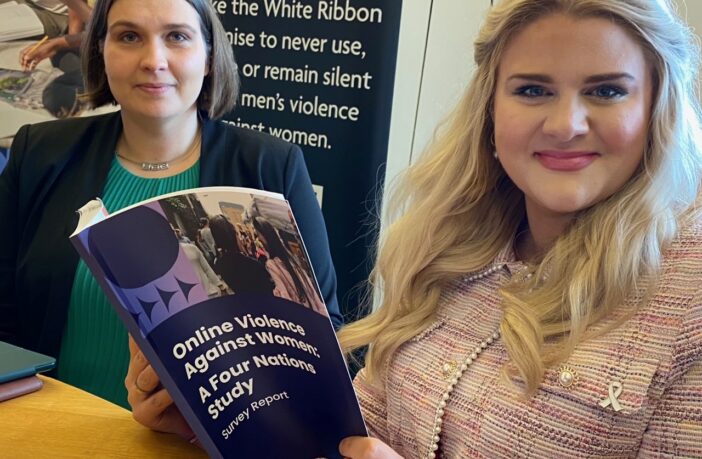- The Open University launches major new report unveiling trends around Online Violence Against Women and Girls in the UK at Houses of Parliament event on Tuesday 19th March
- Online violence against women and girls is most rife on X/Twitter, followed by Facebook and Instagram
- Public sentiment supports the criminalisation of online violence against women (OVAW)
The full report of the largest-ever UK study into online violence against women and girls, designed and led by Professor Olga Jurasz at The Open University, has been launched and discussed at the Houses of Parliament.
The launch, in partnership with White Ribbon – a charity dedicated to ending men’s violence against women and girls was attended by politicians, including Alex Davies-Jones MP, Shadow Minister for Domestic Violence and Safeguarding, as well as media, charities, industry regulators and policy makers.
According to the report, titled ‘Online Violence Against Women: A Four Nations Study’, over one in seven women across all four nations (15%) have experienced online violence, but young women and non-heterosexual women are bearing the brunt of online violence in the UK.
Young people bear the brunt of online violence in the UK
Young people are more likely to experience and witness online violence against women and girls, which is also more likely to be sexually explicit. They are also more likely to know the people who committed the violence against them and for this to move offline. Meanwhile, LGB+ people are the least likely group to know the people committing the violence but are the group most likely to have online violence progress offline.
The report examines which platforms women are experiencing the most online violence, with X/Twitter emerging on top, followed by Facebook/Meta and Instagram. Violence is most likely to move offline via Snapchat, with users less able to put measures in place to protect themselves on the platform. Women users of Snapchat and TikTok attribute the negative impact of OVAW to disruptions in their attendance at school or college, potentially as a result of the location of the perpetrators.
Online violence has a far-reaching impact
The impact of OVAW extends far beyond the digital realm, infiltrating many aspects of the victims’ lives. Women note feelings of being silenced online as well as enduring detrimental effects to their mental and physical health.
Professor Olga Jurasz, Professor of Law at The Open University and Director of the new Centre for Protecting Women Online, who designed and led the study, said:
“This study gives a unique insight into women’s experiences of online violence, its scale and impact across the UK. It provides previously unavailable data which hopefully will lead the way to evidence-based law and policy interventions tackling the modern phenomenon of online violence against women and improving women’s safety online.”
The findings suggest there is an urgent need for more to be done to protect women from harm online. Most women who experienced online violence report it to the platform where the incident happened, but vast majorities of them were not satisfied with the outcomes of their complaint. Women are also dissatisfied with governmental efforts, with almost half (four in 10) suggesting the Online Safety Bill (as it was at the time of the survey) is ineffective in tackling OVAW.
The idea of criminalising OVAW is popular amongst the public; across the UK, over four in five people would support this.
Alex Davies-Jones, MP, Shadow Minister for Domestic Violence and Safeguarding, said:
“In a world where online abuse against women is sadly commonplace, it is remarkable that there is so little data about it. Professor Olga Jurasz at The Open University is setting the bar for research communities, with this vast and important data set.
Women are already restricting and modifying our behaviour online due to the threat of abuse. This is not and will never be an acceptable response to this violence. Tackling online misogyny must take a holistic approach. Criminal offences alone won’t tackle this issue – platforms must proactively prevent their services from being used to abuse and harass, and stop women and girls from becoming victims in the first place.
We need effective policing, tech companies enforcing policies and civil society groups holding them to account when they fail. Understanding the online environment, as this report helps us do, is key. I will continue to fight to stamp out violence against women and girls, online and anywhere else it may raise its ugly head.”
The OU is also set to open a new centre protecting women and girls against online violence later this year. Based in Milton Keynes, the centre will be led by Professor Olga Jurasz to develop research to inform law, policy, technology development and practice to prevent and reduce harms suffered by women and girls online.
Report information
The report surveyed 7819 adults over the age of 16, via YouGov.
* NB – Breakdown of respondents by nation
- England – 3148
- Scotland – 2104
- Wales – 1053
- Northern Ireland – 1514
All Interviews were conducted online between 1st – 28th February 2023.
Photo credit: Philippa Green, The Open University



